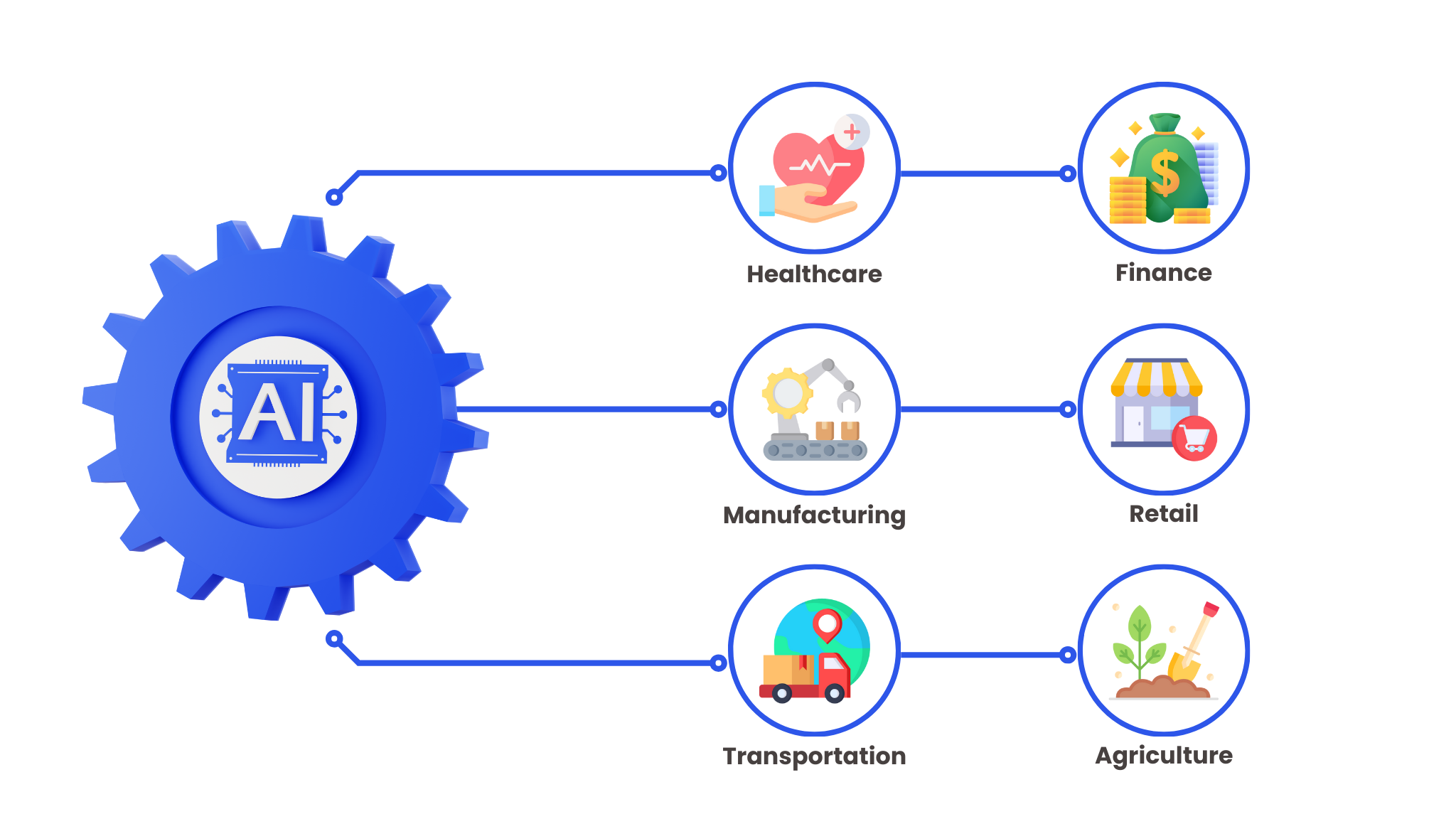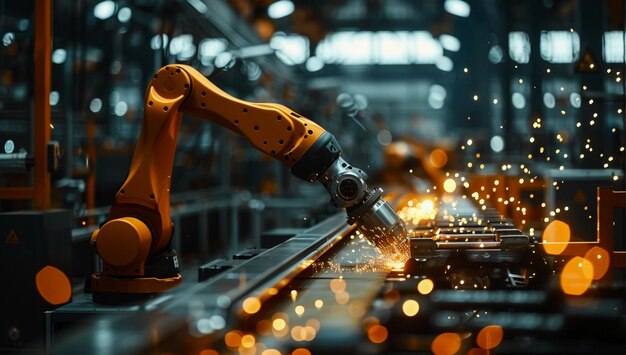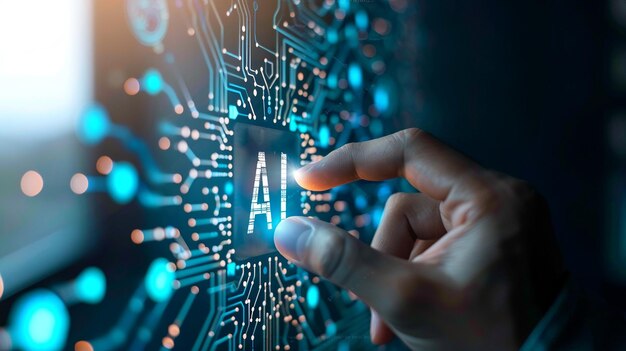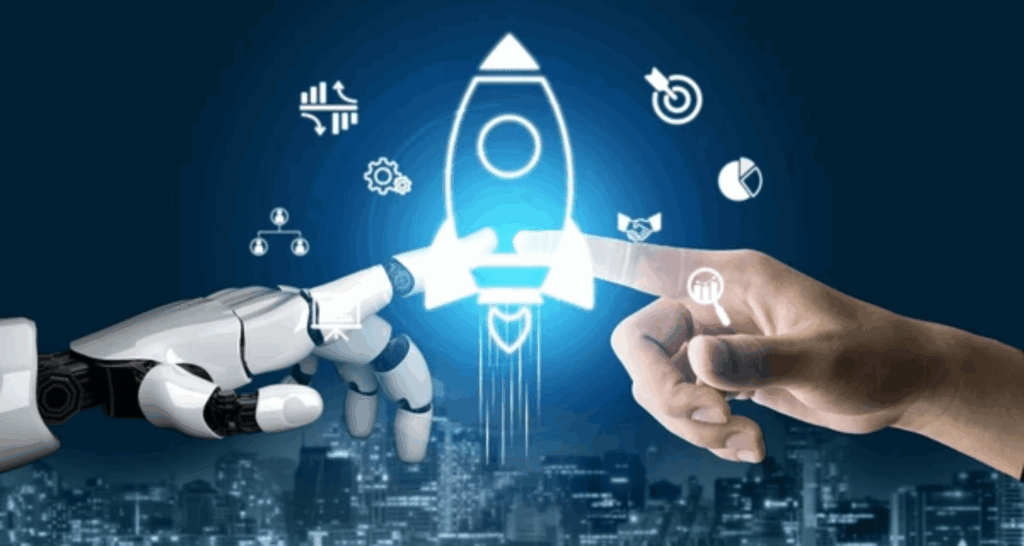How AI is Transforming Industries: A Deep Dive into Real-world Applications
Artificial Intelligence (AI) is quickly becoming a huge force across many industries. In 2022, the global AI market reached $86.9 billion, and experts believe it will grow to $407 billion by 2027. This rapid expansion shows how much businesses adopt AI to improve efficiency, solve problems, and boost economic growth. However, AI isn’t just about doing things faster—it’s about doing things smarter.
AI is expected to increase the U.S. Gross Domestic Product (GDP) by 21% by 2030. While some worry that AI will replace jobs, it’s also creating opportunities, with estimates suggesting that around 97 million new jobs will be available globally by 2030.
So, how is AI transforming industries today? Let’s look at some real-world examples to understand the impact of AI in industries and how it’s shaping the future of business.

AI in Healthcare: Improving Diagnosis and Patient Care
Healthcare is one of the industries benefiting the most from AI. With AI, doctors and healthcare providers can work more efficiently, providing faster and more accurate diagnoses. AI helps analyze large amounts of data, allowing for better decision-making and personalized patient care.
AI in Diagnostics
In healthcare, AI systems are now used to speed up and improve the accuracy of diagnostics. For example, AI can scan X-rays, MRIs, and other medical images much faster than doctors, identifying issues like tumors or fractures that could be overlooked.
IBM Watson Health, for instance, has been a game-changer in cancer treatment. Watson scans thousands of medical papers and patient records to help doctors recommend personalized treatment plans. This not only saves time but also improves the chances of recovery for patients.
AI in Predictive Healthcare
AI also helps doctors predict health problems before they occur. By analyzing a patient’s medical history and genetic data, AI can identify risks and help doctors prevent diseases from developing.
A good example is Google’s DeepMind, which uses AI to analyze eye scans and detect diseases like diabetic retinopathy long before patients show symptoms. Early detection can prevent blindness and other serious health issues.
AI in Finance: Fighting Fraud and Making Smarter Decisions
The finance industry has embraced AI to streamline processes, reduce risks, and enhance customer service. AI is particularly useful in fraud detection and algorithmic trading, helping banks and financial institutions make quicker and smarter decisions.
Fraud Detection and Risk Management
AI in finance plays a very important role in identifying fraud. AI systems analyze thousands of transactions in real time to flag suspicious activity. This allows financial institutions to stop fraud before it causes serious damage.
Mastercard uses AI to monitor millions of transactions every day, quickly identifying and blocking fraudulent activities. This helps both businesses and customers feel secure when making payments.
AI-Driven Algorithmic Trading
AI has transformed trading by allowing algorithms to make faster and more accurate trades based on real-time market data. These AI systems analyze financial markets, economic trends, and historical data to guide investment decisions, helping traders reduce risks and maximize profits.
BlackRock, a global asset management company, uses its Aladdin AI platform to analyze investment risks and make better financial decisions. By processing large amounts of market data, the platform helps traders spot profitable opportunities and manage risks more effectively.
AI in Manufacturing: Boosting Productivity and Quality Control

Manufacturing is another industry where AI has made a big impact. From automating processes to improving quality control, AI helps manufacturers produce goods more efficiently and with fewer errors.
Predictive Maintenance in Manufacturing
AI in manufacturing is especially valuable when it comes to predictive maintenance. AI systems can analyze data from machines to predict when they will need repairs, preventing unexpected breakdowns and saving companies money.
Siemens, for example, uses AI to monitor the condition of its machines and predict maintenance needs before any major issues arise. This ensures smoother operations and reduces costly downtime.
AI-Driven Robotics and Automation
In factories, AI-powered robots perform repetitive tasks faster and more accurately than humans. These robots can also learn from their mistakes, improving their efficiency over time.
A company like FANUC, a leader in robotics, uses AI to help its robots work more independently. These robots can perform tasks like welding, assembling parts, and packaging products, all while learning to do them better with each repetition.
AI in Retail: Personalizing Shopping and Managing Inventory
Retail is another sector where AI is making a noticeable difference. AI is helping stores offer personalized shopping experiences, manage inventory better, and improve customer satisfaction.
Personalized Shopping Experiences
Have you ever noticed how online shopping platforms recommend products you might like? That’s AI at work. By analyzing your browsing habits, past purchases, and preferences, AI systems can suggest products that are more likely to appeal to you.
Amazon has one of the most advanced AI recommendation systems. Their AI can suggest products based on your previous shopping behavior, making it easier for customers to find what they need and for Amazon to increase sales.
Inventory Management and Supply Chain Optimization
AI also helps retailers manage their inventory more efficiently. By anticipating consumer preferences, stores can avoid the pitfalls of overstocking or understocking. This helps reduce costs and ensures customers can always find what they’re looking for.
Walmart uses AI to manage its inventory across thousands of stores, ensuring that the right products are always in stock. By analyzing customer buying patterns, Walmart can anticipate demand and adjust its inventory in real time.
AI in Transportation: Autonomous Vehicles and Smart Logistics
The transportation industry is experiencing a shift toward automation, with AI leading the way in self-driving cars and smart logistics. These technologies are improving safety, reducing costs, and making transportation more efficient.
Autonomous Vehicles: A Glimpse into the Future
AI is at the heart of self-driving cars. These vehicles rely on AI to process data from sensors, cameras, and GPS systems to make real-time decisions about driving. The goal is to increase the efficiency and safety of transportation by reducing human error.
Tesla’s Autopilot is a perfect example of AI in action. Tesla uses AI to help its cars navigate the roads, avoid obstacles, and make driving decisions, such as when to change lanes or stop at a red light. This technology is paving the way for a future where self-driving cars could become the norm.
AI in Smart Logistics
AI is also transforming how goods are transported. By assessing data such as traffic patterns and weather conditions, AI systems can plan more effective delivery routes, saving time and money on gasoline.
DHL, one of the world’s largest logistics companies, uses AI to optimize its delivery network. AI helps DHL plan the fastest routes, cutting down on delays and guaranteeing on-time delivery of items.
AI in Agriculture: Smarter Farming for Better Yields
Even in agriculture, AI is helping farmers grow more food with less waste. From monitoring crop health to optimizing irrigation, AI-powered tools are making farming more efficient and sustainable.
AI in Precision Farming
With AI, farmers can gather real-time data on soil conditions, weather patterns, and crop health. This data helps them make smarter decisions about when to plant, water, and harvest crops, improving yields and reducing the need for fertilizers and pesticides.
John Deere, a company known for its farming equipment, has integrated AI into its machinery. These AI-driven tools can analyze soil data and recommend the best planting strategies to maximize yields while minimizing environmental impact.
Harnessing AI for a Bold New Future

AI is no longer just a cutting-edge concept; it’s fast becoming the driving force behind some of the most significant changes in business today. Whether it’s advancing healthcare diagnostics, fortifying financial security, streamlining manufacturing, or enhancing the retail experience, AI is revolutionizing industries in ways we once only imagined. The companies that are tapping into AI’s potential are not just surviving—they’re thriving by working smarter, not harder.
More than automating tasks, AI is enabling businesses to unlock new levels of creativity, solve complex challenges, and deliver exceptional value. It’s about augmenting human capabilities to drive innovation and push boundaries. As AI advances, it will transform how industries adapt, grow, and compete in the global marketplace.
Embracing AI ensures businesses remain at the forefront of innovation, transforming challenges into opportunities and leading with confidence into a future where technology and human ingenuity go hand in hand. AI is the cornerstone of that future, and those who harness its power will define the path forward.




